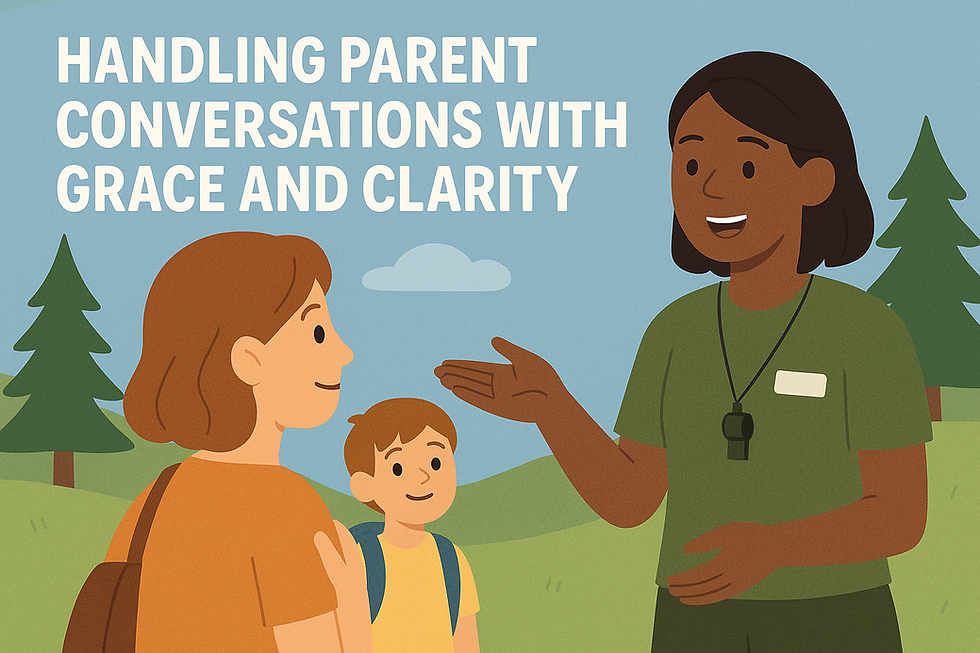The Ultimate Guide to Planning Summer Camp Themes: Tips and Ideas (plus free planning template)
- GoLookSee

- Feb 28, 2024
- 3 min read

The key to a successful summer camp lies in careful planning, creativity, and a deep understanding of the children we serve. Here's a comprehensive guide to planning summer camp themes, designed to inspire both new and seasoned camp directors.
1. Understand Your Audience
First and foremost, know the age group of your campers. Different age groups have different interests, abilities, and attention spans. For younger children, themes based on storybooks or animals might be captivating. Older campers might be more engaged by adventure, science, or technology themes. Always consider the developmental stage and interests of your audience when planning.
2. Involve Your Staff in the Planning Process
Your staff is your greatest resource. Involve them in the brainstorming process early on. They can offer fresh ideas and perspectives based on their interactions with the campers. Plus, staff engagement in the planning process helps ensure they are more invested in the camp's success.
3. Embrace a Broad Theme
Choose a theme that's broad enough to allow for a variety of activities but focused enough to give your camp a unique identity. For example, a "Time Travel" theme could include days dedicated to the dinosaurs, medieval times, the future, etc. This approach keeps the content fresh and engaging for campers throughout their time at camp.
4. Plan Themed Activities that Promote Learning and Fun
Every activity should tie back to your theme in a way that is both educational and entertaining. Whether it's crafts, sports, science experiments, or group games, ensure that each activity reinforces the theme while also contributing to the campers' learning and enjoyment.
5. Don't Forget About Tradition
While innovation is key, maintaining certain camp traditions can provide a sense of continuity and community. Whether it's a specific game, song, or closing ceremony, traditions help build a bond among campers and staff.
6. Flexibility is Crucial
Always have a backup plan. Outdoor activities are a big part of the camp, but the weather can be unpredictable. Have a list of indoor activities that can also tie into your theme for those rainy days.
7. Incorporate Technology Wisely
In today's digital age, incorporating technology can enhance the camp experience. Use apps or digital platforms to facilitate scavenger hunts or to explore the night sky. However, balance is key. The essence of camp is to connect with nature and each other, so use technology in a way that enhances rather than detracts from this experience.
8. Feedback is Gold
After each camp session, gather feedback from campers, parents, and staff. What did they enjoy the most? What could be improved? Use this feedback to refine and improve your camp themes and activities for the next year.
9. Safety First
Always plan with safety in mind. Ensure all activities are age-appropriate and that your staff is well-trained in safety protocols. Whether it's ensuring the proper use of equipment or managing allergies and dietary restrictions, the well-being of your campers and staff is paramount.
10. Market Your Camp Effectively
Your theme can be a powerful marketing tool. Use it to create engaging promotional materials that highlight the unique experiences your camp offers. Social media, word-of-mouth, and local community boards are great channels to spread the word.
By following these guidelines, you can create a memorable and enriching summer camp experience that children will cherish. Remember, the goal is not just to entertain, but to inspire and educate, creating lasting memories that campers will look back on fondly for years to come.
Staff members are the custodians of the camp theme, responsible for maintaining its energy and relevance. Strategies for preparing counselors involve not just imparting information but instilling a sense of creativity, encouraging them to contribute ideas and enthusiasm that elevate the overall theme experience.
The unpredictable nature of the weather and the diverse interests of campers present challenges in theme execution. Incorporating strategies for adapting themes in response to unexpected weather conditions and providing a range of themes that cater to a broad spectrum of camper interests are crucial aspects to address.




Comments